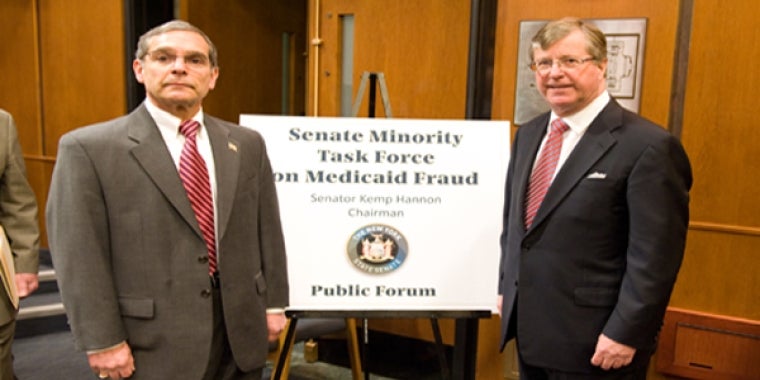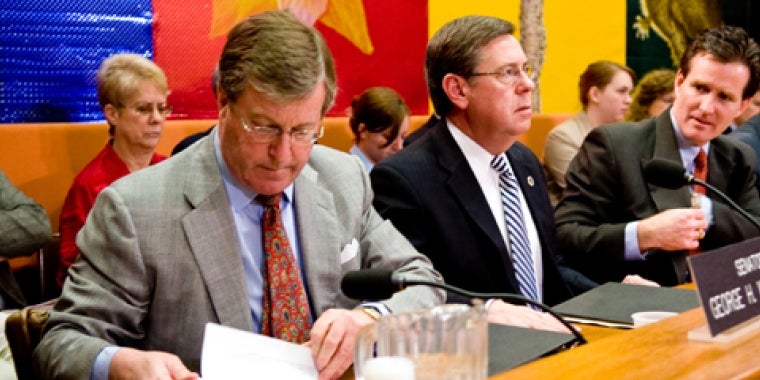
Winner: Legislature Shouldn't Wait To Authorize Direct Shipment Of Wine

Albany, N.Y.-- State Senator George H. Winner, Jr. (R-C, Elmira)is sponsoring legislation in the Senate to allow Finger Lakes wineries and winemakers throughout New York State to ship their products directly to out-of-state consumers.
Winner said that New York’s existing, Prohibition-era law prohibiting New York’s wineries from shipping wine directly to customers outside the state is outdated and the single greatest obstacle to significant growth within the industry. The state’s ban on these interstate sales is the focus of a legal challenge currently before the nation’s highest court.
"In a day and age when online commerce becomes an increasingly important economic development tool, Finger Lakes wineries and winemakers throughout New York State are shackled by this outdated, unfair law," said Winner. "It makes no sense, in any way, for our state to prevent economic growth within an important industry."
New York is the third-largest wine producing state in America, with 192 wineries statewide. The industry employs 18,000 workers and annually generates more than $500 million in gross sales, together with $85 million in state and local tax revenue. Over three million people visit the state’s wineries every year. One-third of them come from out of state. Many New York winery owners, particularly those who operate smaller wineries, say current state law prevents them from accommodating thousands upon thousands of these out-of-state visitors once they leave New York and return home. The law bans out-of-state shipments to individual consumers, but it allows New York wineries to ship to New York residents.
Winner said that if wineries were granted limited, direct shipment privileges to out-of-state customers, as his legislation proposes, it would represent a significant and important market expansion, and facilitate new and important economic opportunities for many Finger Lakes wineries. For some wineries it’s estimated that direct shipment could increase sales by as much as 30 percent.
When he released his 2005-06 proposed state budget two weeks ago, New York Governor George Pataki included, for the second straight year, an interstate shipment proposal similar to the one Winner proposes. The governor estimates that authorizing direct shipments would raise $2.6 million in 2005-06 and, by 2007-08, $3.8 million a year in increased revenues for New York State.
"I applaud the governor’s recognition that we shouldn’t wait. Let’s strengthen the industry and create jobs. Let’s collect the revenue and put it to good use. It’s a common sense proposal whose time has come," Winner said. "Governor Pataki’s leadership and active support gives new life to this legislation."
If enacted, Winner’s legislation would:
> enable wine manufactured by licensed New York wineries and wine sold by licensed New York retailers to be shipped in limited quantities to individual consumers in other states that have reciprocal direct shipping statutes. Currently 26 other states allow some form of direct wine shipment;
> require out-of-state shippers to obtain a license from the New York State Liquor Authority and adhere to strict reporting requirements and regulations when carrying and delivering wine into New York. Direct shipments could only be made to individual adult consumers in New York, for personal use only. Proposed regulations would require carriers to obtain the signature of a person over 21 years old at the delivery address;
> subject all wine shipped from New York to the payment of all New York alcoholic beverage taxes. Wine shipped into New York would be subject to the payment of all state sales and excise taxes.
Winner downplayed concerns raised by some opponents of the measure that it would encourage and facilitate underage drinking. He pointed to a July 2003 Federal Trade Commission report that found that "states that permit interstate direct shipping generally report few or no problems with shipments to minors." He also highlighted his legislation’s safeguards to prevent wine shipments from reaching underage recipients.
Winner acknowledged that some state legislators may be reluctant to act prior to a decision by the United States Supreme Court that could come as early as March. The Supreme Court heard oral arguments last December in two cases challenging the constitutionality of state laws in Michigan and New York limiting interstate trade. Both the New York case, Swenderberg v. Kelly, and the Michigan case deal with the constitutionality of laws preventing wineries from shipping directly to out-of-state consumers while permitting intrastate shipping from in-state wineries.
"We shouldn’t wait for the courts to decide the future of an industry that is central to the culture and economy of our region and other regions throughout New York State," Winner said. "We shouldn’t overlook the opportunity before us to strengthen an important and noteworthy state industry."
At the least, Winner said, state lawmakers should lay the groundwork for a rapid response to any Supreme Court decision handed down this spring. If the court rules New York’s existing law unconstitutional, Winner said that the Legislature and the governor will need to act swiftly to put in place the necessary regulatory, reporting and revenue-collecting systems that will ensure an effective and responsible transition to the direct shipment of wine into and out of New York State. If the court decides to allow New York’s ban on interstate sales to continue, he stressed that it’s even more imperative for the Legislature to act on its own to authorize direct shipping privileges.



